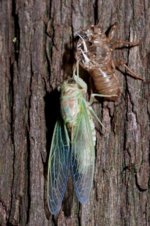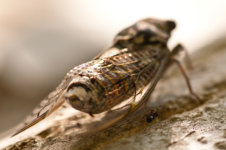skychaser
Well-Known Member
http://blogs.smithsonianmag.com/sma...-about-to-be-blanketed-by-a-swarm-of-cicadas/
It’s been 17 years since the cicadas of Brood II swarmed the northeastern United States. A mass of winged creatures, red eyes glowing, the cicadas “are expected to emerge and overwhelm a large swath of land from Virginia to Connecticut — climbing up trees, flying in swarms and blanketing grassy areas so they crunch underfoot,” says WNYC.
Across the United States, different broods of cicadas emerge after long withdrawls underground, some on 13-year cycles, some, like Brood II, on 17-year cycles.
Cicadas live in the ground, near trees. They feed off the roots of trees. And they only come out for a few weeks, during which time they will molt and then mate. The females will lay eggs that hatch and the nymphs will then burrow underground to start a new 17-year-cycle, while the adult cicadas die.
The cicadas come in such great numbers, and the noises they make so loud (like the sound of a water bottle being squeezed, but sped up and multiplied by a great number, says WNYC) that people often find themselves afraid of the foreign insect frenzy. Never fear, though, as cicadas are harmless to people: “they can’t bite you or sting you or hurt you in any way.”
Though some cicadas are around every year, says Ditmas Park Corner, a website for the Brooklyn neighborhood, these 17-year cicadas are a different beast and will appear in far greater numbers.
The Brood II cicadas won’t come out of the ground until the “temperature eight inches below the surface hits 64 degrees,” says the Nieman Journalism Lab, and WNYC has a fun citizen science project—the Cicada Tracker—that you can join if you want to help track the cicadas’ emergence.
According to Charles Q. Choi for Scientific American, scientists don’t actually know why the Brood II cicadas take 17 years to emerge.
It’s been 17 years since the cicadas of Brood II swarmed the northeastern United States. A mass of winged creatures, red eyes glowing, the cicadas “are expected to emerge and overwhelm a large swath of land from Virginia to Connecticut — climbing up trees, flying in swarms and blanketing grassy areas so they crunch underfoot,” says WNYC.
Across the United States, different broods of cicadas emerge after long withdrawls underground, some on 13-year cycles, some, like Brood II, on 17-year cycles.
Cicadas live in the ground, near trees. They feed off the roots of trees. And they only come out for a few weeks, during which time they will molt and then mate. The females will lay eggs that hatch and the nymphs will then burrow underground to start a new 17-year-cycle, while the adult cicadas die.
The cicadas come in such great numbers, and the noises they make so loud (like the sound of a water bottle being squeezed, but sped up and multiplied by a great number, says WNYC) that people often find themselves afraid of the foreign insect frenzy. Never fear, though, as cicadas are harmless to people: “they can’t bite you or sting you or hurt you in any way.”
Though some cicadas are around every year, says Ditmas Park Corner, a website for the Brooklyn neighborhood, these 17-year cicadas are a different beast and will appear in far greater numbers.
The Brood II cicadas won’t come out of the ground until the “temperature eight inches below the surface hits 64 degrees,” says the Nieman Journalism Lab, and WNYC has a fun citizen science project—the Cicada Tracker—that you can join if you want to help track the cicadas’ emergence.
According to Charles Q. Choi for Scientific American, scientists don’t actually know why the Brood II cicadas take 17 years to emerge.



